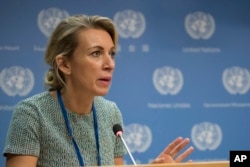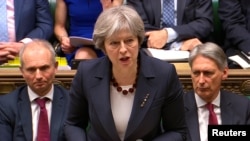As the dispute between Britain and Russia mounted Saturday over the poisoning on British soil of a former Russian spy, with the Kremlin announcing the expulsion of 23 British diplomats, Russia’s foreign ministry came up with yet another theory about the origin of the toxin used.
Russia’s foreign ministry listed four European countries as the most likely source for the Novichok nerve agent British officials say was used. Topping the list was Britain itself — the other three, Slovakia, the Czech Republic and Sweden.
In an interview with a Russian state broadcaster on the eve of Sunday’s presidential election here, foreign ministry spokeswoman Maria Zakharova suggested all three states, along with Britain, had been “carrying out intense research” on Novichok, but she offered no evidence for her assertion.
Czech Foreign Minister Martin Stropnicky rebuffed Zakharova’s assessment, saying, “We reject such groundless statement on the origins of the Novichok.”
Worsening rift
The rupture is worsening between Britain and Russia over the nerve-agent poisoning of former spy Sergei Skripal and his 33-year-old daughter, who were found slumped and unconscious March 4 in a sleepy English cathedral town.
British lawmakers and analysts are urging British Prime Minister Theresa May not to hesitate to seize assets invested in Britain of Russian plutocrats tied to Russian leader Vladimir Putin.
Among the properties that should be targeted, say lawmakers eager for an immediate response to the expulsion of British diplomats, is property owned by companies registered to Russia’s first deputy prime minister Igor Shuvalov, and the London house worth more than $150 million of oligarch Roman Abramovich, owner of Chelsea soccer club.
The Kremlin’s announcement Saturday of the expulsion of British diplomats had been the expected like-for-like response to the British government’s expulsion earlier this week of the same number of Russian diplomats. Midweek the British prime minister unveiled a raft of reprisals for what London says was a Kremlin-approved assassination attempt on Skripal, a double agent Putin once vowed publicly to kill, and his daughter.
Targeting assets
British officials say father and daughter remain in critical condition. A policeman who was among the first to try to help the pair is still hospitalized but is now in stable condition.
British toxicologists say Novichok was used in the assassination attempt. The Kremlin has denied any involvement and offered shifting explanations of what may have happened, including that the British are just making it up.
May told British lawmakers Wednesday her government intended to “freeze Russian state assets wherever we find evidence that they may be used to threaten the life or property of UK nationals or residents.”
And she promised a crackdown on the money that has flowed into London from Russia’s “corrupt elite,” but was short on details. Now in the wake of Saturday’s expulsions and the closing in Russia of the British Council, a cultural outreach mission funded by the British foreign office, officials in London are plotting more targeted sanctions on oligarchs and associates of the Russian leader.
A British official told VOA there would be no rush but there is collective agreement among ministers that Britain needs to respond toughly. One of the challenges in targeting Kremlin-linked investments in London is avoiding impacting assets of wealthy Russians who are not tied to Putin but who also may not be able to offer clear proof of the origins of their money.
There are also concerns that Moscow might subject British Petroleum, which owns a 20 percent stake in a Russian oil firm, to sanctions.
But political pressure is mounting on May not to back off. Lord Macdonald, a former senior legal officer, says a “really aggressive financial strategy” against those associated with Putin was Britain most effective weapon. He told Britain’s Sunday Times newspaper, the May government needs to pursue a “much more aggressive” and finely tuned campaign against “the Russians in the financial sphere.”
“It’s financial attacks that are the most dangerous for Putin because if people around him believe that he’s risking their fortunes then that’s the one thing likely to shake their confidence in him,” he added.
Russia casts doubt
Russian foreign ministry spokeswoman Zakharova also sought to cast doubt about the British allegation that Novichok was used.
“How did they come to the conclusion about a Russian footprint if they didn’t give us those samples? Logically they shouldn’t have this substance. Which samples have they compared with to draw such a conclusion?” she added. “Questions arise: then, they should have samples, which they conceal, or it is a lie from start to finish.”
The Kremlin has warned that Russia could take further measures, if Britain makes any more “unfriendly” moves toward Russia.






